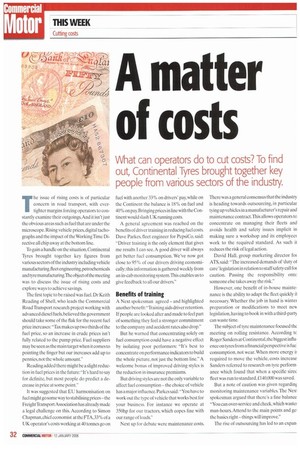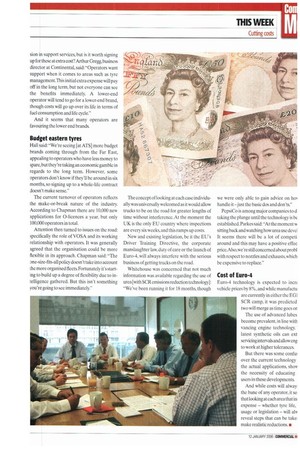A matter of costs
Page 32

Page 33

If you've noticed an error in this article please click here to report it so we can fix it.
What can operators do to cut costs? To find
out, Continental Tyres brought together key people from various sectors of the industry.
The issue of rising costs is of particular concern in road transport, with evertighter margins forcing operators to constantly examine their outgoings.And it isn't just the obvious areas such as fuel that are under the microscope. Rising vehicle prices, digital tachographs and the impact of the Working Time Directive all chip away at the bottom line.
To gain a handle on the situation, Continental Tyres brought together key figures from various sectors of the industry including vehicle manufacturing, fleet engineering, petrochemicals and tyre manufacturing.The object of the meeting was to discuss the issue of rising costs and explore ways to achieve savings.
The first topic to be raised was fuel. Dr Keith Reading of Shell, who leads the Commercial Road Transport research project working with advanced diesel fuels. believed the government should take some of the flak for the recent fuel price increases: "Tax makes up two thirds of the fuel price, so an increase in crude prices isn't fully related to the pump price. Fuel suppliers may be seen as the main target when it comes to pointing the finger hut our increases add up to pennies, not the whole amount."
Reading added there might be a slight reduction in fuel prices in the future: It's hard to say for definite, but most people do predict a decrease in price at some point."
It was suggested that EU harmonisation on fuel might go some way to stabilising prices—the FreightTransport Association has already made a legal challenge on this. According to Simon Chapman,chief economist at the FTA,33% of a UK operator's costs working at 40 tonnes go on fuel with another 33% on drivers' pay, while on the Continent the balance is 18"k on fuel and 40% on pay. Bringing prices in line with the Continent would slash UK running costs.
A general agreement was reached on the benefits of driver training in reducing fuel costs. Dave Parkes. fleet engineer for PepsiCo, said: "Driver training is the only element that gives me results I can see. A good driver will always get better fuel consumption. We've now got close to 95% of our drivers driving economically; this information is gathered weekly from an in-cab monitoring system.This enables us to give feedback to all our drivers."
Benefits of training
A Next spokesman agreed — and highlighted another benefit:"Training aids driver retention. If people are looked after and made to feel part of something they feel a stronger commitment to the company and accident rates also drop."
But he warned that concentrating solely on fuel consumption could have a negative effect by isolating poor performers: "It's best to concentrate on performance indicators to build the whole picture, not just the bottom line." A welcome bonus of improved driving styles is the reduction in insurance premiums.
But driving styles are not the only variable to affect fuel consumption — the choice of vehicle has a major influence. Parkes said: -You have to work out the type of vehicle that works best for your business. For instance we operate at 350hp for our tractors, which copes fine with our range of loads."
Next up for debate were maintenance costs. There was a general consensus that the industry is heading towards outsourcing, in particular tying up vehicles in a manufacturer's repair and maintenance contract:This allows operators to concentrate on managing their fleets and avoids health and safety issues implicit in making sure a workshop and its employees work to the required standard. As such it reduces the risk of legal action.
David Hall, group marketing director fot ATS, said: "The increased demands of 'duty ot care' legislation in relation to staff safety call for caution. Passing the responsibility onto someone else takes away the risk."
However, one benefit of in-house maintenance is the ability to adapt the fleet quickly ii necessary. Whether the job in hand is wintet preparation or modifications to meet nev. legislation, having to book in with a third-part} can waste time.
The subject of tyre maintenance focused thc meeting on rolling resistance. According tc Roger Sanders at Continental, the biggest influence on tyres from a financial perspective is fue: consumption, not wear. When more energy i! required to move the vehicle, costs increase Sanders referred to research on tyre perform. ance which found that when a specific sizec fleet was run to standard.£140,000 was saved.
But a note of caution was given regardini monitoring maintenance variables. The Nexi spokesman argued that there's a fine balance -You can over-service and check,which waste! man-hours. Attend to the main points and gel the basics right — things will improve."
The rise of outsourcing has led to an expan. sion in support services, but is it worth signing up for these at extra cost? Arthur Gregg, business director at Continental, said: "Operators want support when it comes to areas such as tyre management.This initial extra expense will pay off in the long term, but not everyone can see the benefits immediately. A lower-end operator will tend to go for a lower-end brand. though costs will go up over its life in terms of fuel consumption and life cycle."
And it seems that many operators are favouring the lower end brands.
Budget eastern tyres Hall said:"We're seeing [at ATS] more budget brands coming through from the Far East, appealing to operators who have less money to spare,but they're taking an economic gamble in regards to the long term. However, some operators don't know if they'll be around in six months, so signing up to a whole-fife contract doesn't make sense."
The current turnover of operators reflects the make-or-break nature of the industry. According to Chapman there are 10,000 new applications for 0-licences a year, but only 100,000 operators in total.
Attention then turned to issues on the road: specifically the role of VOSA and its working relationship with operators. It was generally agreed that the organisation could be more flexible in its approach. Chapman said: "The one-size-fits-all policy doesn't take into account the more organised fleets. Fortunately it's starting to build up a degree of flexibility due to intelligence gathered. But this isn't something you're going to see immediately." The concept of looking at each case individually was universally welcomed as it would allow trucks to be on the road for greater lengths of time without interference. At the moment the UK is the only EU country where inspections are every six weeks, and this ramps up costs.
New and existing legislation, be it the EU's Driver Training Directive, the corporate manslaughter law, duty of care or the launch of Euro-4, will always interfere with the serious business of getting trucks on the road.
Whitehouse was concerned that not much information was available regarding the use of urea [with SCR emissions reduction technology]: "We've been running it for 18 months, though we were only able to gain advice on hoi handle it —just the basic dos and don'ts."
PepsiCo is among major companies to d taking the plunge until the technology is laf established. Parkes said: "At the moment w sitting back and watching how urea use deve It seems there will be a lot of competi around and this may have a positive effec price.Also,we're still concerned about probl with respect to nozzles and exhausts, which be expensive to replace."
Cost of Euro-4 Euro-4 technology is expected to inert vehicle prices by 8%, and while manufactu are currently in either the EGI SCR camp, it was predicted two will merge as time goes on The use of advanced lubes become prevalent, in line with vancing engine technology. latest synthetic oils can ext servicingintervalsand allow eng to work at higher tolerances.
But there was some confu! over the current technology the actual applications, shov the necessity of educating users in these developments.
And while costs will alway the bane of any operator, it se that looking at each area that in expense — whether tyre life, usage or legislation — will alv reveal steps that can be take make realistic reductions. •
























































































































































































